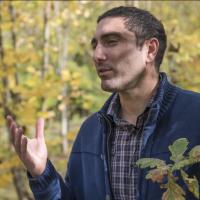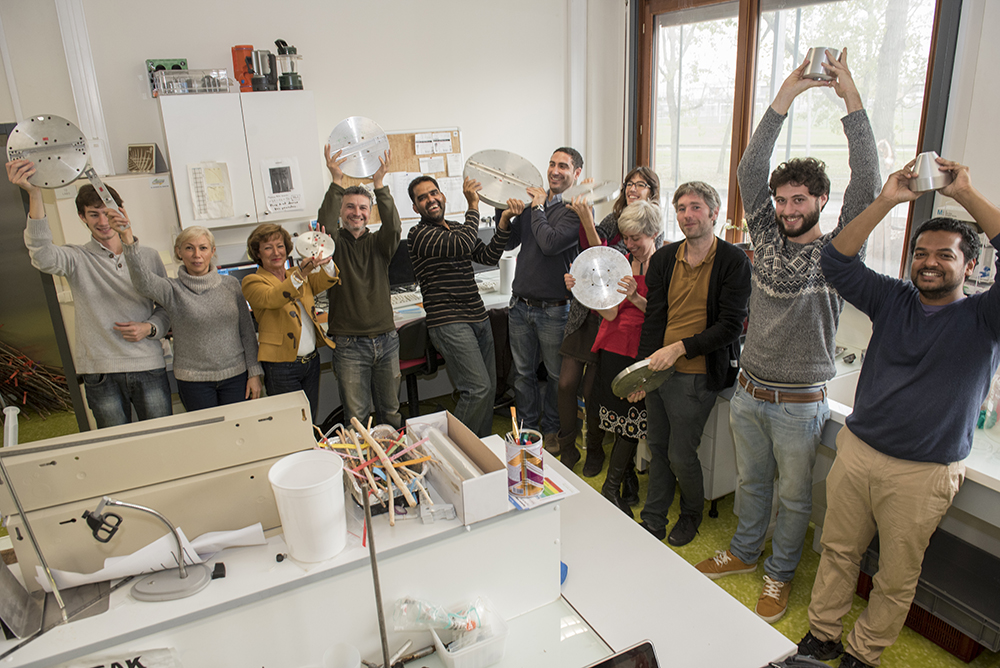
Climate change and risks Reading time 6 min
Sylvain Delzon, tackling drought, root and branch
Published on 08 November 2015
For French ecophysiology research, 2012 was a vintage year! Sylvain Delzon, a new hire at INRA Bordeaux (Joint Research Unit for Biodiversity, Genes and Communities), co-authored an article in Nature that really made headlines. The article provided an explanation for the widespread forest dieback observed around the world and provided proof that trees have reached their maximum ability to cope with drought conditions. The remarkable findings were made with the help of an unusual piece of technology known as a “cavitron”
The laws of cavitation
In just a few short years, this tall, dark, and winsome researcher managed to transform his unit’s hydraulics laboratory into an international ecophysiology hotspot. Scientists from the four corners of the Earth come to “CaviPlace” to carry out tests using material developed by the energetic and creative Delzon. In less than 20 minutes, a software program called “CaviSoft” working with a modified centrifuge can plot the vulnerability of a conifer to drought. The cavitation resistance of half the world’s 620 conifer species was measured here in Delzon’s laboratory, and is where a world record was discovered in 2015 for the most drought-resistant tree species: Callitris tuberculata, found in Australia. Over the course of the past year, another unique tool, the MegaCavitron, has been measuring the performance of trees with long vascular systems, such as oaks and tropical species, and crop plants, such as grapevine.
A science scrum
Climate is rapidly changing, causing shifts in forest distribution patterns. The distribution of the holm oak in France is marching ever northwards, “Mediterraneanising” the country’s Atlantic Coast. In southern France, Delzon has observed a decline in the growth of beech trees. Beech populations in the Pyrenean foothills already live in a climate hotter than optimal for them. Delzon made these findings in Sauternes on a small island in the Garonne River where he carried out provenance tests1 to study the ability of oak, beech, and fir populations to adapt and the speeds at which they could do so. “The remarkable thing about Sylvain is his ability to explain genetic variability in adaptive traits of interest in relation to climate change” says Christophe Plomion, deputy director of the Forest, Grassland and Freshwater Ecology Division (EFPA). “He is the forerunner of a new field of science: evolutionary ecophysiology".
INRA encourages openness and innovation
For someone whose given name means “forest” in Latin, Delzon’s career path was not foreordained. As the son of a farmer and a farmer himself, with a keen interest in tractors, Delzon would have preferred to study crop plants. But the montane forests of Montana and the Pyrenees cast their spell when Delzon was doing his post-doctoral research with the “Nobel” laureate of the forestry world and recipient of the 2011 INRA Award for Scientific Excellence, Antoine Kremer. Kremer is unapologetically pleased to see his protégé receive an INRA Award, “Sylvain’s enthusiasm, drive, and charisma are contagious. The spirit he has helped create in the laboratory really drives his research.”
A long pass
Just as when he was a rugby fullback for Agen, Delzon runs headlong into his work. He has already published 71 scientific texts, 50 of which since he arrived at INRA. He beams positive energy and good nature to five post-doctoral and four doctoral students, an engineer, and a number of technicians. This former university staff lecturer remains highly committed to teaching, providing 30 hours of classroom teaching time now. Together with his colleague and friend Hervé Cochard he founded a specialised scientific journal, the Journal of Plant Hydraulics. With a broad smile, a genuine expression, and his arms crossed, Delzon says he was very touched to receive this award from INRA, “a place where I have felt at home to carry out the research that I love, at the intersection of ecology and agricultural science. INRA really favours forward thinking, openness, and innovation. And the ongoing technical support we receive is a major asset.”

After circling the globe to collect samples of half the world’s 620 conifer species, Sylvain Delzon is developing a number of new projects to work on in his unit:
- Identifying the mechanisms for cavitation resistance in crop plants (wheat, grapevine), grassland plants (clover, cocksfoot, fescue), tropical trees, and, of course, in every scientist’s favourite model plant species, Arabidopsis thaliana.
- A project dear to his heart is the publication of the largest database on drought resistance in conifers in order to understand the evolution of the trait within this group of trees. To make the database more complete, Delzon plans to collect even more samples from species in Vietnam, Laos, Cambodia, and Yunnan.
- Measuring the adaptive capacities of populations and determining the speed at which functional traits associated with reproduction and survival evolve, in order to predict forest responses to environmental change.
- 38 years old, one child
- Background: Ecophysiology
- 2004: PhD in functional ecology, INRA Bordeaux, ISPA (formerly EPHYSE)
- 2004: Post-doctoral fellowship in evolutionary ecology, BIOGECO, INRA Bordeaux
- 2005: Post-doctoral fellowship in ecophysiology, Université du Montana, Missoula, USA.
- 2006-2011: Lecturer, University of Bordeaux
- 2011: Research scientist, BIOGECO
- 2015: Research director, BIOGECO
- Co-founder and joint editor-in-chief of the Journal of Plant Hydraulics. A key aspect of this open access journal is that it is both free to read and free to publish. PLOS ONE academic editor.
- Interests: fine wines, tractors, rugby, fly fishing
- INRA Award for Promising Researcher
